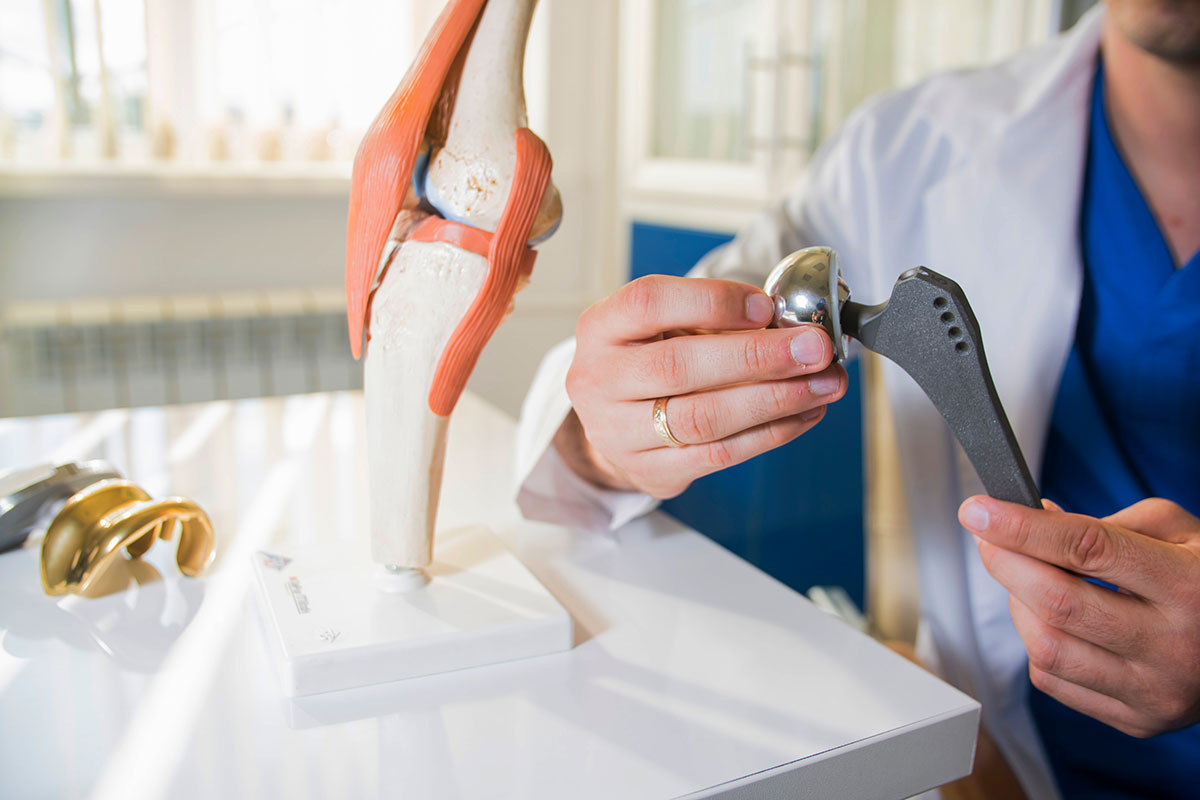Orthopedic Hip Surgeon
The Leading Hip Treatment Center in Spartanburg, Duncan, and Greenville, SC
Expert Hip Care in South Carolina
Why Would My Doctor Recommend Hip Surgery?
Struggling with hip pain that’s not responding to conservative treatments like physical therapy or medication can be complicated, especially if your doctor is recommending surgery.
At Carolina Orthopaedic and Neurological Associates, we understand the complexities and challenges of enduring hip pain that doesn’t improve with conventional treatments like physical therapy or medication. Experiencing such discomfort can be daunting, particularly when surgery becomes a consideration.
Conditions like osteonecrosis and cartilage tears often require specialized orthopedic hip surgery, which might seem overwhelming. However, at our esteemed facilities in Spartanburg, Duncan, and Greenville, our expert physicians are committed to exploring and prioritizing non-surgical treatments first.
Our team is dedicated to providing compassionate, effective care to help you navigate this journey towards better health and comfort.
There are a variety of hip conditions and disorders that our specialists treat. If you do not see a condition below, please contact our office and we will answer any questions you may have.
What Conditions Might Require Hip Surgery?
Common Hip Injuries Leading to Surgery
Our specialists treat a range of hip conditions. The most common injuries requiring orthopedic hip surgery include:
Fracture: Breaks near the hip in the upper part of the femur, often caused by trauma.
Bursitis: Inflammation of the bursa, a fluid-filled sac in joints.
Dislocation: Occurs when the head of the femur moves out of its socket.
Labral Tear: Damage to the cartilage surrounding the hip joint socket.

Common Hip Treatments
Hip surgery is suggested only when all other options have been exhausted. Our Hip Center Experts are dedicated to treating patients with the most effective course of treatment available.
Hip Pain
The ball and socket hip joint is important because it stabilizes and moves the trunk or core. An accident, injury or medical condition can cause hip pain that makes performing everyday movements and activities difficult. An appointment with a Carolina Orthopaedic and Neurosurgical Associates (CONA) hip specialist should be made if a serious accident or injury causes hip pain or non-accident/noninjury related hip pain does not go away on its own.
Learn more about Hip Pain
Hip Arthritis
Hip arthritis is a common condition that inflames and damages hip bone, cartilage and soft tissue. Mild hip arthritis can be aggravating and uncomfortable. Moderate to severe hip arthritis can make it difficult to perform everyday movements and decrease the quality of life. Because hip arthritis is a chronic condition, treatment is centered around slowing down or stopping disease progression. An appointment with a Carolina Orthopaedic and Neurosurgical Associates (CONA) hip specialist should be made at the first sign of hip arthritis symptoms.
Learn more about Hip Arthritis
Total Hip Replacement
The damaged bone and cartilage are removed and replaced with prosthetic components during a total hip replacement (also known as total hip arthroplasty). If you decide to have hip replacement surgery, your orthopaedic surgeon may request that you undergo a thorough physical examination by your primary care physician prior to the procedure. An appointment with a Carolina Orthopaedic and Neurosurgical Associates (CONA) hip specialist should be made at the first sign of significant hip pain.
Additional Information for Total Hip Replacement.
Hip Dislocation
A hip dislocation involves the head of the thighbone (femur) coming out of the socket of the hip joint. Most of the time, it takes a lot of force to move the hip out of place, and it is usually caused during a car accident, from a big fall, an injury from sports, or a workplace accident.
Learn more about Hip Dislocation.
Gout
Gout can be a painful condition that occasionally requires collaborative care between rheumatologists, orthopedists, and neurologists to increase the patient’s quality of life. Some patients with gout may only experience one or two flares their whole lives, while others may have painful recurrent problems.
Learn more about Gout.
Hip Fracture
A hip fracture is a break in the upper part of the thigh bone (femur) near its articulation with the pelvis. A hip fracture may make it difficult to walk, bear weight, stand or sit. An appointment with a Carolina Orthopaedic and Neurosurgical Associates (CONA) hip specialist should be made as soon as possible after an accident or injury causes hip fracture symptoms.
Learn more about Hip Fractures
Hip Bursitis
Bursae are fluid-filled sacs that lie between joint bones and soft tissues. The two hip bursae are located on the hip bone point (the greater trochanter) and the inside of the hip near the groin. Hip bursitis is inflammation of the hip bursae. An appointment with a Carolina Orthopaedic and Neurosurgical Associates (CONA) hip specialist should be made when hip bursitis symptoms are experienced.
Learn more about Hip Bursitis
Hip Joint Injections
A hip injection is a medicine injection into the hip joint. The medication can help with pain and inflammation relief. It can also aid in the diagnosis of hip pain. An appointment with a Carolina Orthopaedic and Neurosurgical Associates (CONA) hip specialist should be made when hip pain symptoms are experienced.
Additional Information for Hip Joint Injections.
Hip Impingement
Hip impingement, also called femoroacetabular impingement (FAI), happens when the femoral head, or “ball of the hip,” presses against the acetabulum, or “cup of the hip.” When this happens, the cartilage around the acetabulum, called the labrum, can get damaged. This can make the hip stiff and painful and can lead to arthritis.
Additional Information for Hip Impingement
Hip Arthroscopy
Hip arthroscopy is a new minimally invasive treatment option that treats many hip injuries and conditions. Patients who experience hip pain are encouraged to make an appointment with a Carolina Orthopaedics and Neurosurgical Associates (CONA) hip specialist to receive an official diagnosis and find out if hip arthroscopy is an appropriate treatment option.
Learn more about Hip Arthroscopy
Hip Labrum Tear
The hip labrum is a rim of soft tissue that surrounds the pelvic acetabulum and acts like a gasket to hold the femoral head in an anatomical position. A torn hip labrum causes hip joint instability and possibly hip joint subluxation or dislocation. An appointment with a Carolina Orthopaedic and Neurosurgical Associates (CONA) hip specialist should be made when an accident or injury occurs and hip labrum tear symptoms present. If left untreated, it could lead to more serious issues that would involve orthopedic hip surgery.
Learn more about Hip Labrum Tears
Partial Hip Replacement
Your doctor replaces the ball of your hip joint but not the socket during partial hip replacement. Metal, ceramic, or plastic is used to make the artificial part. This surgery is used to repair specific types of hip fractures. Patients who experience hip pain are encouraged to make an appointment with a Carolina Orthopaedics and Neurosurgical Associates (CONA) hip specialist to receive an official diagnosis and find out if hip arthroscopy is an appropriate treatment option.
Additional Information on Partial Hip Replacement.
Hip Dysplasia
Hip dysplasia is the medical term for a hip socket that doesn’t fully cover the ball part of the upper thighbone. This lets the hip joint move out of place, either partially or fully. Most people who have hip dysplasia have it from birth.
Patients who experience hip pain are encouraged to make an appointment with a Carolina Orthopaedics and Neurosurgical Associates (CONA) hip specialist to receive an official diagnosis and start your treatment path.
Additional Information on Hip Dysplasia.
Identifying Hip Injuries
Hip injuries can be prevalent across all age groups, particularly in athletes, overweight individuals, and seniors. These injuries may also impact nearby areas like the sciatica, leg, groin, or spine, complicating diagnosis.
What Are the Types of Hip Surgery?
Hip Surgery Procedures at Carolina Orthopaedic and Neurological Associates:
We offer various hip surgery procedures, considering the patient’s specific condition and health background. Our Hip Center Experts in Spartanburg, Duncan, and Greenville, NC, are dedicated to providing the most effective treatments.
Our approach to hip treatment is conservative, suggesting surgery only after exploring all other options. We focus on:
Maintaining a healthy weight
Practicing proper posture
Cushioning hips while sleeping
Wearing comfortable shoes
Warming up and stretching before exercises
Modifying exercises to avoid pain
3 Things to Expect from Hip Surgery at Carolina Orthopaedic and Neurological Associates
Before Hip Surgery:
Preparation includes physical examinations, blood and urine tests, electrocardiograms, stress tests, X-rays, and radiographs to ensure readiness for surgery.
During Hip Surgery:
Patients will meet with surgeons and anesthesiologists to discuss procedures. We advise wearing loose-fitting clothing for comfort and ease during the surgery process.
After Hip Surgery:
Recovery varies but typically spans two to four weeks, depending on factors like activity level, age, nutrition, and overall health. Post-surgery, patients are advised to avoid certain movements to ensure proper healing.
Personalized Care and Advanced Treatments at Carolina Orthopaedic and Neurological Associates
At Carolina Orthopaedic and Neurological Associates, we understand that each patient’s situation is unique. Our team of experienced surgeons and healthcare professionals is committed to providing personalized care tailored to each individual’s needs. We utilize the latest techniques and technologies in hip surgery to ensure the best outcomes for our patients. From initial consultation to post-operative care, we are dedicated to supporting our patients every step of the way.
Ready to Take the Next Step? Contact Us Today!
If you or a loved one is experiencing hip pain or considering hip surgery, don’t wait. Contact Carolina Orthopaedic and Neurological Associates today to schedule a consultation. Our expert team in Spartanburg, Duncan, and Greenville, NC, is ready to help you find the best solution for your needs. Call us or visit our website to learn more and take the first step towards improved mobility and quality of life.
South Carolina Orthopedic Hip Surgery Locations
Spartanburg, South Carolina
1330 Boiling Springs Rd, Ste 1600
Spartanburg, SC 29303
Directions to Spartanburg
Hours: 8:00 a.m. to 5:00 p.m.
Contact us: (864) 501-0541
Duncan, South Carolina
115 Deacon Tiller Ct.
Duncan, SC 29334
Directions to Duncan
Hours: 8:00 a.m. to 5:00 p.m.
Contact us: (864) 362-3461
Greenville, South Carolina
220 Roper Mountain Road Ext
Greenville, SC 29615
Directions To Greenville
Hours: 8:00 a.m. to 5:00 p.m.
Contact us: (864) 582-6396

